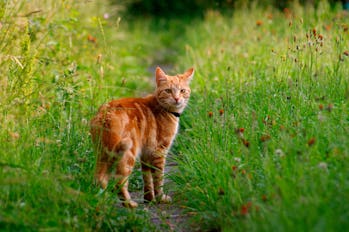Is there a serial killer in your home? Or is your cat just an extrovert? | Celia Haddon

Seeing the happy face of my cat, William, at the catflap utilized to make my coronary heart sink. Usually, a limp body would be protruding from his mouth. Worse continue to, often the corpse was struggling, resulting in William chasing the luckless mouse or young rat all-around my kitchen for half an hour or much more. For me, this was the dark aspect of cat possession.
However, apparently it was also a signal that I had a cat with an extrovert temperament, with self esteem in the basic safety of his house territory, according to a new review. The findings incorporate to a expanding physique of evidence that cats have distinctive character traits, just like people.
The “feline five” persona attributes, in accordance to previously scientists, are neuroticism (insecure, shy and anxious), dominance (bullying and aggressive to other cats), impulsiveness (erratic and reckless conduct), agreeableness (mild and welcoming in the direction of human beings) and extroversion.
Extrovert felines are lively, clever, pretty curious and, according to a new Utilized Animal Conduct Science study, serial killers. Cats hunt for satisfaction, even however most domestic cats have loads of foods at property. A hunter cat’s concept of a fantastic day is to go out and kill a thing. It is this practice of looking for satisfaction rather than foodstuff that infuriates wildlife lovers such as Chris Packham, who has urged the RSPB and RSPCA to speak out about cats attacking garden birds.
All my cats have loved to hunt. I adore mice and I am sorry cats get rid of them, but I have under no circumstances thought of it good to my felines to preserve them shut up indoors all their life, not able to practise the hunting they like. Does this indicate they have all been extroverts? Judging by the study’s conclusions, it would appear so.
There was ginger Toby, who was pretty agreeable, but being cross-eyed, not a effective hunter. However, he brought property a rat when that ran up the corner of the wall prior to, luckily, slipping into a wellington boot that I was keeping underneath (wellies are wonderful for capturing rodents). There was fluffy, tabby and white William, who used to sit for times outside my neighbour’s woodpile in buy to ambush the occasional weasel. William was gentle and agreeable, but also an extrovert. He roamed much and vast in the neighbouring fields.
So, have I just by chance only experienced extrovert cats? This seemed a little bit unlikely to me when I viewed as Tilly, my adored tortoiseshell. She was certainly shy and nervous (neuroticism), and also quite loving and mild to me (agreeableness). But she was a wonderful hunter. Admittedly, she by no means brought her prey into the residence – a indication that she did not sense thoroughly confident even at residence. Was she then a non-extrovert expert hunter? I attempt to observe the science, but I experienced uncertainties about this distinct backlink amongst hunting and feline extroversion. There appeared to be a disconnect involving my scientific expertise and my anecdotal knowledge.
Even so, the arrival of Mr Spangles in my daily life not too long ago has put my uncertainties to relaxation. Gray, middle-aged Mr Spangles does not do predation. Not at all. He goes out briefly into the garden then hides powering the backyard get rid of, disregarding the pigeons on the wall and the frogs in the little pond. When he to start with arrived, he did not even do hunting play. He shrank back with panic from my tries to interact his curiosity with a fishing rod toy.
Evidently, Mr Spangles is not an extrovert. He is a neurotic. The trait of neuroticism influences almost all his conduct. It wipes out any trait of agreeableness, as he nips me routinely. Neuroticism dominates his behaviour, and although I am educating him to enjoy with a fishing rod toy, I do not consider regional wildlife have anything at all to dread from him. He is a cat Chris Packham would be very pleased of.
-
Celia Haddon is the co-writer, with Prof Daniel Mills, of Being Your Cat: What is Likely on in Your Feline’s Intellect
-
Do you have an opinion on the concerns elevated in this article? If you would like to post a response of up to 300 terms by e mail to be regarded as for publication in our letters part, you should click below.







